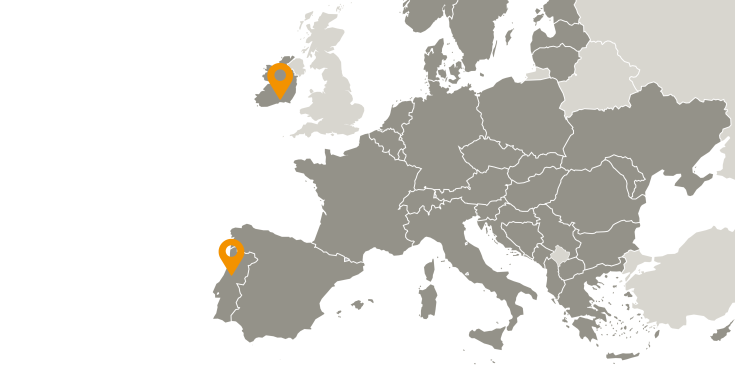From Ireland to Portugal via sustainable transport

In early July, Dr. Darren McAdam-O’Connell from the Interreg Europe EMBRACER project hopped on his bike in Cork, Ireland, and set off to the sunny city of Coimbra, Portugal for a staff exchange with other project partners.
While other summer travellers were heading to the nearest airport for their respective trips, Darren was doing things a little differently. He was going to make it to Portugal using only sustainable transport methods.
Planes, trains and automobiles? Not quite
Following his departure from Cork, Darren went to Rosslare, where he took a ferry to Bilbao, Spain. Once in Spain, he travelled along the coast, making his way to the western coast of Spain before descending to Portugal. All this was done exclusively by bike and using public transport methods, including his trip back to Ireland at the end of the staff exchange. Both trips (there and back) took around six days to complete.

I think we've got to lead by example.
“You can’t do one thing and say another”, Darren told us. “I think we’ve got to lead by example. If you don't experience the difficulties people have, you’re not in the best position to solve them.”
Improving transport to and from periphery regions
Travelling from Ireland to Portugal, Darren said he got a closer look at the transportation struggles experienced by people living in periphery regions, which are regions far from central economic areas.
He was interested in judging whether certain transport methods were ‘really’ accessible, or accessible only ‘on paper’. “The people we have to reach, the people whose lives are really impacted by transport poverty, car dependency and social isolation, are the people in the periphery”, explained Darren.
The learnings are especially pertinent given the context of Darren’s involvement in the EMBRACER project, which aims to improve policies that would connect underserved regions with urban areas through ‘informal modes’, which include transport methods such as cycling, ride-hailing and car/ bike/ scooter sharing. Darren joins the project as coordinator of the Cork Transport & Mobility Forum, one of the key partners of the Cork Environmental Forum for transport and mobility issues.
In the end, Darren’s bike trip was complicated. He described feeling “floored” at times by the “really hostile road infrastructure”, which he said was really “scary and difficult” to bike. At other moments, he found himself on public transport systems that were not adapted for people carrying bikes. His trip became even more complicated upon nightfall. More than once, he arrived late in small towns and did not know where he was going to sleep.
Simple solutions
By the end of his trip, he felt that while he successfully completed his mission, not everyone could have done so.
“Public transport has to have a low barrier to entry. It means that you need to just turn up and know that you’re going to get where you’re going without having […] obstacles put in your way. It needs to be convenient for people who are not experts in the system”.
Yet Darren stated that he was able to go as far as he did only because of being able-bodied and experienced. The Corkonian also noted that some of his struggles transporting the bike (for example, limited storage space on public transport) could also be equally or even more limiting for those who use wheelchairs or have other mobility restrictions.
Despite the complications, he believes that finding a solution might be easier than it seems. “Not a lot would have to be done to make it easy”, he emphasised. “It should have been possible that I rolled off that ferry on Bilbao, rolled my bike easily onto a train, connected in Santander and was in Ferrol that night, not three days later.”
“This would not require billions of investments in new infrastructure”, he said. “It would require a slightly different timetable.”